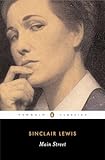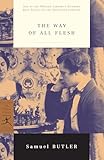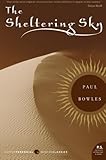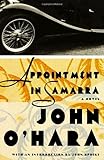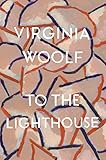 To write this installment of Modern Revue, I located and reread the copy of To the Lighthouse I had in college. The shock that the novel delivered to my booze-sodden collegiate nervous system is demonstrable. My copy looks like a creature, bristling with orange post-its. Obscure marginal notes abound, many of which are enormously insightful. My favorites include: “father castrates his lighthouse,” “a sexual woman, all the children = all the sex,” and “what will he put in her ‘bag’?” There is a liberal sprinkling of “vagina” and “phallus,” and one “oh dear,” presumably the moment when I called for my smelling salts. The class, naturally, was Introduction to Literary Theory.
To write this installment of Modern Revue, I located and reread the copy of To the Lighthouse I had in college. The shock that the novel delivered to my booze-sodden collegiate nervous system is demonstrable. My copy looks like a creature, bristling with orange post-its. Obscure marginal notes abound, many of which are enormously insightful. My favorites include: “father castrates his lighthouse,” “a sexual woman, all the children = all the sex,” and “what will he put in her ‘bag’?” There is a liberal sprinkling of “vagina” and “phallus,” and one “oh dear,” presumably the moment when I called for my smelling salts. The class, naturally, was Introduction to Literary Theory.
I can remember writing a paper on this novel, and thinking myself into a hole (and a headache) trying to assert what Virginia Woolf’s position was on Scimitars and Fountains, The Phallus and The Lighthouse and The Vagina. But I can also remember being astonished by the novel’s beauty, which astonishes me still. It is perplexing and crowded with saucy imagery, but it is full of true things. I wonder if there is a book more packed with truth, one that carries as much weight per word. I know there is no other book that caused me so fervently to say “There it is!” and mean, “You know, like, life.”
It surprises me that I do like this book so much. I am very sensitive to experimental narratives. There are, of course, a vast number of exceptions to this prejudice. Usually, though, if I pick up a book and the story runs away from me, I feel intensely irritated and pained. The Sound and the Fury? Agony. At Swim-Two-Birds? Agony. Brief Interviews With Hideous Men? What the fuck.
To the Lighthouse walks a remarkable line, I think, forging ahead with art, but preserving clarity, and my sanity. There are a lot of characters. And there are confusing moments, especially if you are reading too fast. I had to return to the parenthetical deaths to make sure I had read correctly. But that was an amazing device; the deaths, parenthetical as they are, feel so unreal and so shocking, and then so real and so sad, much like they do in life. And before you know it, the story continues and the dead are gone, also like life.
I shudder to say this, but this is a book that meant a lot to me as a woman. I liked Edan’s description of the “mom book.” I think her “mom book,” is something I usually think of as the “lady book.” Lady books are different than “chick lit” – they don’t have shoes or poodles on the cover. They are also different from books that are by women, which can be any kind of book at all. Lady books feature heavy feelings with a chance of magic and sparkles, and, like Edan said, little irony. They also have no jokes whatsoever. The once and future queen of the lady books is, in my opinion, Alice Hoffman.
After a high school love affair with these books, I largely renounced them. For one, many lady books sound like many other lady books. I’m not sure how to describe it, but they all have exactly the same cadence, and it’s creepy. For another, I feel enough of life is dictated by one’s parts that one’s books needn’t be. As a result of this renunciation, I hesitate to admit that I like a book for a reason directly pertaining to my sex. So many books are marketed to me as my kind of book, because they have sea anemones and clasped hands on the front. And I hate it, so it makes me wary of saying “I, possessed of a certain chromosome pairing, feel this work is important,” when I do find a book that makes me feel that way. And To the Lighthouse is that kind of book, and it’s a shame that I feel icky saying it.
I see the novel, to some extent, as documenting an evolutionary stage in womanity (and thus, humanity). Mrs. Ramsay – beautiful, mother of eight – dies and goes, while Lily Briscoe, unmarried and “puckered,” lives and stays, and finally gets to finish her damn painting. That’s the story. Woolf doesn’t create such a hammy, obvious dichotomy as I’ve done; Lily and Mrs. Ramsay (and Cam, and Prue, and Minta, and Mrs. McNab) share between them a hundred facets of the “feminine experience.” That’s not to say that all women must love the novel or agree with me about the feminine experience, or that men are peripheral to the novel, and that they can’t “understand” why it’s great (not to say either, of course, that all men are the same). That’s nonsense. But it amazes me how true some of the passages feel to me personally eighty years later. I’ve felt so many of the things described in the book, particularly the ones that are ascribed to the female characters. I have had those “infidel ideas,” imagining
A life different form hers; in Paris, perhaps; a wilder life; not always taking care of some man or other; for there was in all their minds a mute questioning of deference and chivalry, of the Bank of England and the Indian Empire, or ringed fingers and lace, though to them all there was something in this of the essence of beauty, which called out the manliness in their girlish hearts, and made them, as they sat at table beneath their mother’s eyes, honour her strange severity, her extreme courtesy…
But I have also felt the “code”:
…It behooves the woman, whatever her own occupation may be, to go to the help of the young man opposite so that he may expose and relieve the thigh bones, the ribs, of his vanity, of his urgent desire to assert himself; as indeed it is their duty, she reflected, in her old maidenly fairness, to help us, suppose the Tube were to burst into flames…
Unlike the lady book, this isn’t a book for women. It is a book that describes certain elements of women’s lives and collective history. It’s a book that should make any person think about gender and society and life and what it’s like and how Woolf’s vision does or does not pertain to him or her. The “code” is a two-way street after all. I’m sure there’s a man out there who doesn’t much feel like giving up his seat on the raft.
One still encounters the Mr. Ramsay-esque artesian well of masculine need. There are still wicked, winsome Cams who grow into sullen teenagers with daddy issues. People still die in wars and childbirth and suddenly in the night. Life is still complicated and silly, for men and women alike. When I finished To the Lighthouse this time, I wished so much that Virginia Woolf was around to do the hard work for us again, that she was here to use her painful sensitivity to to the world and to take the world and set it down so we could say “There it is!” (again). But I should just be grateful that she lived to do it the first time, and that she did it so well then.




